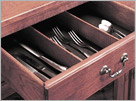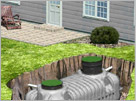You are here: Homepage » Articles » Winter Plumbing Problems
How to Avoid Common Plumbing Problems in Winter
When winter comes along, temperatures drop considerably and attack exposed plumbing. Avail of the following tips by professional plumbers on how to avoid common plumbing problems in winter.
Outside Kitchen Sink Wall
 Contractors install the kitchen's sink on the outside wall of the home so that you can enjoy the view while working around the sink. When temperatures drop water lines located on outside walls can easily freeze. Plumbers recommend opening cabinet doors and letting room temperatures flow inside cabinets. Warm air will prevent pipes from freezing. You can always increase temperatures by placing space heaters next to open doors of cabinets.
Contractors install the kitchen's sink on the outside wall of the home so that you can enjoy the view while working around the sink. When temperatures drop water lines located on outside walls can easily freeze. Plumbers recommend opening cabinet doors and letting room temperatures flow inside cabinets. Warm air will prevent pipes from freezing. You can always increase temperatures by placing space heaters next to open doors of cabinets.
Septic Tank
 Homeowners fail to check the levels of waste in their septic tank and experience unpleasant sewage backups when their tanks are overloaded with waste. Digging into frozen ground to access the cesspool and replacing frozen pipes will be much more expensive than having your septic system cleaned regularly. It is highly recommended to have your septic tank pumped out by a professional plumber before winter to avoid emergency backups.
Homeowners fail to check the levels of waste in their septic tank and experience unpleasant sewage backups when their tanks are overloaded with waste. Digging into frozen ground to access the cesspool and replacing frozen pipes will be much more expensive than having your septic system cleaned regularly. It is highly recommended to have your septic tank pumped out by a professional plumber before winter to avoid emergency backups.
Water Heater
 Faulty parts, sediment deposits, and blown pilot pipes can all prevent your water heater from providing hot water. To avoid cold showers this winter have your water heater serviced by a professional plumber.
Faulty parts, sediment deposits, and blown pilot pipes can all prevent your water heater from providing hot water. To avoid cold showers this winter have your water heater serviced by a professional plumber.
Freezing Pipes
 Frozen pipes are the most frequent emergency plumbing problem that plumbers are called for in winter. Exposed plumbing pipes tend to freeze in low temperatures, and without immediate thawing they eventually bust. Before temperatures drop look for exposed pipes that need insulation and protection against the weather elements. Wrap heat tape around exposed pipes to keep water lines warm during winter.
Frozen pipes are the most frequent emergency plumbing problem that plumbers are called for in winter. Exposed plumbing pipes tend to freeze in low temperatures, and without immediate thawing they eventually bust. Before temperatures drop look for exposed pipes that need insulation and protection against the weather elements. Wrap heat tape around exposed pipes to keep water lines warm during winter.
Winterize Plumbing Fixtures not in Use
Outside toilets, showers and sinks that are not used during winter should be winterized to protect them from cracking and freezing in low temperatures. Shut water supply to exposed plumbing fixtures and drain out water from tanks and basins. Next, unscrew P-traps of external plumbing fixtures and empty water inside, after which reinstall the P-traps. You can always add non toxic anti-freeze to tanks and traps for more protection against freezing.
 Plumbers
Plumbers
 Advertise in Multiple Websites
Advertise in Multiple Websites Pay for what you get
Pay for what you get
 (800) 325-9150
(800) 325-9150